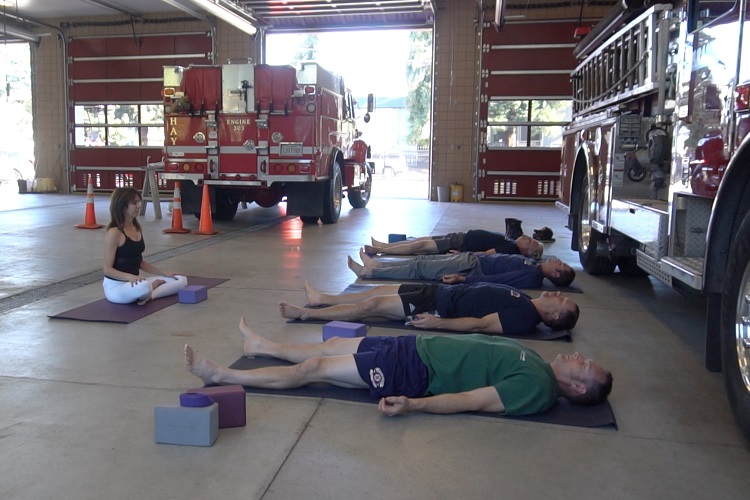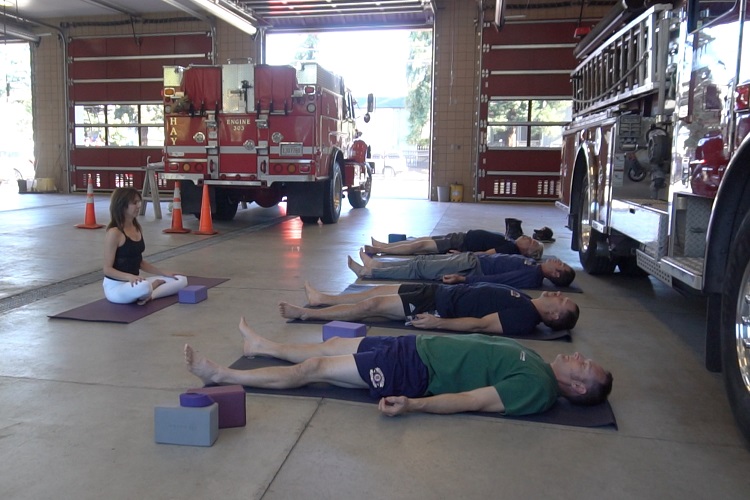

By Shannon McQuaide
There is a common misconception about yoga practice inside fire stations. Many people assume that firefighters are unavailable to run calls during yoga. Not only is this untrue, but yoga practice primes firefighters to deliver optimal service to their communities.
One such example is an experience I had at a busy urban fire station. About 10 minutes into class, a call came in. I tried to make sense of the dispatcher’s words, but all I could decipher as the engine crew left was that an urban camper sitting on a bench outside the entrance of a well-heeled hotel was complaining of pain. The hotel’s manager called 911 to have the man treated for pain and removed from the property.
There was some grumbling as the engine crew left to respond to this frequent flyer. Twenty minutes passed before I heard the apparatus bay doors open and they rejoined the class. During the transition, the paramedic on the call said, “Shannon, because of yoga, I found myself treating this person with more patience and compassion.”
I like to retell this story and others like it because it’s a testament to the many benefits of yoga including a positive shift in behavior, if only temporarily. I have often experienced a similar phase change in my mood following yoga practice—feeling mellower and kindness toward others. This experience can last for several hours or even a few days, depending on the style of yoga and the instructor. But inevitably, these good feelings dissipate, and I return to an emotional baseline characterized by striving, busyness, and attainment.
I began to think about behavior and what propels us to act so benevolently following a yoga session. And further, why these good feelings are short-lived. What I learned, primarily through reading Daniel Goleman and Richard Davidson’s book Altered Traits, is that the drivers behind temporary benevolence are compassion and loving kindness. In Pali, an ancient language, “loving kindness” is called Metta and refers to wishing that other people be happy; whereas “compassion” entails the wish that people be relieved of suffering. In training our minds through meditation, both compassion and Metta can be strengthened. Moreover, these practices can lead to the action of helping others,1 which is what the paramedic felt as he worked on the man outside the hotel.
It turns out that our brains might be primed for loving kindness. In one research study, a group of volunteers practiced generating loving kindness during a six-hour instructional session and also at home on their own. Before learning loving kindness practices, these volunteers were presented with graphic images of people suffering. Only their negative circuits for emotional empathy were activated, meaning that the brains of the volunteers were transferring the suffering of the victims on to themselves. Feeling the pain of another person as if it’s our own pain can lead to emotional exhaustion and burnout, especially for firefighters who encounter human suffering regularly.1
But when another group of volunteers practiced cultivating compassion and were presented with images of people suffering, their brains activated a completely different set of circuits and are expressed through the love a parent has for their children. Further compassion training muted empathic distress, increasing the capacity to confront and deal with human suffering—and to do so without the need to tune out or shut down our feelings to self soothe. (1)
The phase changes expressed by the volunteers were established after just eight hours of practice. And what we now know is that to move from temporary feelings of compassion or benevolence (a phase change) toward a tendency to experience these feelings (state change) requires longer periods of practice.
Following are traditional phrases found in Metta practice:
May you be safe
May you be happy
May you be healthy
May you experience peace
Reference
- Goleman D and R.J. Davidson. Altered Traits: Science Reveals How Meditation Changes Your Mind, Brain, and Body. 2017. Print.
 Shannon McQuaide is a registered yoga instructor with Yoga Alliance and the founder of the FireFLEX YogaTM program. FireFLEX Yoga was developed through her work with the San Jose (CA) Fire Department, where she continues to lead FireFLEX Yoga classes. She is a certified functional movement trainer and has a master of arts degree in leadership and psychology. Shannon@fireflexyoga.com http://www.fireflexyoga.com.
Shannon McQuaide is a registered yoga instructor with Yoga Alliance and the founder of the FireFLEX YogaTM program. FireFLEX Yoga was developed through her work with the San Jose (CA) Fire Department, where she continues to lead FireFLEX Yoga classes. She is a certified functional movement trainer and has a master of arts degree in leadership and psychology. Shannon@fireflexyoga.com http://www.fireflexyoga.com.

